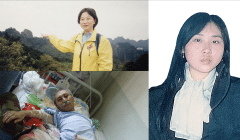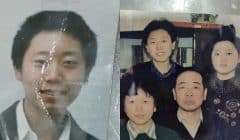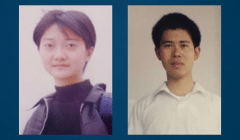Confessions of a Chinese Consular Official

Canberra, July 26, 2005. Former Chinese political consul Chen Yonglin, gives evidence today to a parliamentary inquiry into the handling of his request for asylum in Australia. Mr Chen applied for political asylum on May 26 after claiming the Chinese government operated an Australian network of 1,000 informants, particularly targeting the Falun Gong spiritual movement, and routinely kidnapped people. (AAP Image/Mark Graham) NO ARCHIVING, INTL OUT
I testify today regarding how the Chinese missions abroad, and specifically in Australia, carry out their policy of persecuting Falun Gong adherents.
According to my knowledge, the persecution of the Falun Gong by China’s Communist Party (CCP) is a systematic campaign. All authorities—and especially those in Public Security, State Security, and Foreign Affairs—are involved.
In each Chinese mission overseas there must be at least one official in charge of Falun Gong affairs. The head and the deputy head of the mission will be responsible for the Falun Gong affairs. I am aware of there being more than 1,000 Chinese secret agents and informants residing in Australia, and they have partaken in efforts to persecute the Falun Gong. The number in the Unites States should be higher, I believe.
During my time at the Chinese Consulate-General in Sydney, some 100 or so delegations headed by senior Chinese officials, ranking above the level of Vice Minister, toured Sydney. This was of course at the Chinese taxpayers’ expense. I often had to look after these corrupt officials. I thus had a chance to hear much internal information about how Falun Gong followers were being captured; all resources available were being used.
Inside the Consulate I read a great deal of confidential background papers on Falun Gong members who were killed in custody. These persons were always accused of being “uncooperative” or said to have “committed suicide,” when in fact they had died of inadequate handling or police brutality.
War on Australian soil
Waging war against the Falun Gong is one of the main tasks of Chinese missions around the world.
In February 2002, the Chinese Consulate-General in Sydney set up an entity called the “Special Group for Struggling Against the Falun Gong,” which was headed by the Consul-General and Deputy Consul-General. It consisted of representatives from all sections of the Consulate, including the Political Research Section, Cultural Propaganda Section, Overseas Chinese Affairs Section, Trade and Commercial Office, as well as Education Office. The Special Group held a meeting once every two weeks.
In 2002, as I came to assume the responsibility for coordinating the Special Group, the said meeting was being held every other month; the following two and a half years, it was held quarterly. The “Falun Gong problem” is the priority for the Consulate, and it is a daily, ongoing affair. The Special Group is part of the 610 Office system—a system designed to persecute the Falun Gong. The model used in Australia for “war on the Falun Gong” is identical to that used in the United States and other countries where the Falun Gong is active. The Falun Gong policy of the Central CCP for overseas missions is “to combat one on one, attack wantonly, attack aggressively.”
Some of the measures taken to deprive the Falun Gong of “breathing space” are as follows.
Large-scale propaganda
In the first half of 2002, the missions in Australia managed to each “successfully” hold anti-Falun Gong photo exhibits. The Chinese Consulate-General in Sydney held its exhibit in the name of “Promoting healthy Chinese culture and opposing the cult.” The Consul-General is quick to preach the Communist Party’s line on Falun Gong whenever he hosts or attends any function.
Consulate staff, meanwhile, frequently send anti-Falun Gong letters, news bulletins, notes, and other print materials to governmental officials; they also do this through various “friends” when necessary. For example, the website of the University of Wollongong displayed in 2004 a photo of a Falun Gong informational booth. However, after a complaint from the Chinese Students Friendship Association, which is controlled by the Consulate, the photo was killed within hours.
Every year the Consulate distributes countless bundles of anti-Falun Gong materials to all levels of the New South Wales (NSW) governments, non-governmental organizations, libraries, schools, and Consulate visitors. Even when the Consulate staff visits remote areas of New South Wales, anti-Falun Gong materials are brought along for distribution.
China Central Television (CCTV) paid Sydney Chinese Television (service offered by Channel 31) for a prime time slot in order to broadcast a CCTV program, “Focus Interview,” that criticized Falun Gong. Certain local Chinese media in Sydney, such as Singtao Daily, Australian Express Daily, the former 2AC Chinese Daily, and the website “Chinatown Online,” are all pro-Party in their reporting and in matters related to Falun Gong.
Once, a Falun Gong practitioner successfully bid for “Half-hour Interview of Your Choice,” which is produced by 2AC Mandarin Radio. However, a Consulate official who attended the bidding immediately afterwards asked the station to lay down certain restrictions for the interview, with the outcome that the Falun Gong practitioner had to give up the interview.
Economic coercion
Those in Australia who have been subject to economic pressure and incentives include the New South Wales state government, the state parliament, and city councils, as well as the state Labour Party and Liberal Party. Facing huge pressure, Bankstown, Rockdale, Hurstville, Burwood and other city councils have struck down motions in support of the Falun Gong or done things supportive of the CCP’s policy of suppression. The Consulate’s work has been very successful, with the outcome that only a handful NSW parliamentarians and councilors are willing to meet with the Falun Gong or speak at their rallies. There are no longer any city councils that dare to issue appreciation letters to the Falun Gong.
Economic approaches have been quite successful. In 2002, China’s communist leaders decided to give the contract for the Guangdong province liquefied natural gas terminal to North West Shelf. This was part of China’s “Grand Border Concept” strategy, meant to gain both natural resources and political compromise from Australia. The Consulate in Sydney has cultivated intimate relations with many federal and state officials by inviting them to China for visits, advancing the officials’ personal business interests in China, and hosting dinners in their honor.
Each year numerous Chinese officials visit Australia. They are given the task of using every possible official occasion to denounce the Falun Gong. Mr. Wu Bangguo, Chairman of the National People’s Congress of the Chinese Communist Party regime, visited Sydney in May 2005. Sure enough, he didn’t forget to denounce the Falun Gong as an “evil cult” when addressing pro-communist figures in the Chinese community; this was despite the fact that there were no Falun Gong protests during his visit.
Fighting “one on one”
The Consulate successfully thwarted the Falun Gong’s attempt to join a Chinese Spring Festival parade. The Consulate has repeatedly forced the New South Wales Railway Authority and the Sydney International Airport Company to take down large lit billboards emblazoned with “Truth, Compassion, Tolerance” (Falun Gong’s main virtues).
In order to prevent a Chinese after-school program (the Minghui School) whose principal is a Falun Gong practitioner from getting sponsorship from the NSW Department of Education and Training, the Consulate put enormous pressure on the Department of Education and Training, and the case is still stuck there.
Meanwhile, after Consulate members spoke with the Fairfield City Council, an initial plan to establish a “Truth, Compassion, Tolerance” stone-engraving was canceled.
There is also a wide-reaching “black list” kept by the Consulate, which contains the names of Australian Falun Gong practitioners. This is used for border checking and surveillance in Australia.
However, not all Consulate complaints are successful. In May 2003, the Consulate’s representation to the NSW Government and the Sydney Council protesting a Chinese cultural performance, which was organized by Falun Gong practitioners, ended in vain. Many Chinese community organizations had been mobilized to write or call the Mayor and councilors. The Consulate went so far as to prepare a scripted letter for people to sign and deliver to the Council. The Council did buckle somewhat, in that it stated it would not send any official to attend the event. But it insisted that the Falun Gong had the right to rent the Sydney Town Hall under a commercial contract.
Mobilizing the Chinese community
Each year Consulate officials attend hundreds of functions held by the local Chinese community. In each instance, the Consulate demands of the host a guarantee that “no Falun Gong” will be present. Many times the Consulate has discussed with the community how to oppose the Falun Gong , and even initiated campaigns wherein people sign complaints against the Falun Gong.
The Consulate has also paid the expenses of certain scholars of China for their travels to China, hoping to encourage them to speak out against the Falun Gong on television or write an op-ed. Some visa applicants have been asked to swear at the Falun Gong demonstrators stationed outside the Consulate.
Controlling and monitoring
The Consulate has twice shared with the Russian Consulate-General in Sydney its main list of Falun Gong practitioners. The latter then helped to intercept a number of Falun Gong practitioners who had wanted to enter Russia during a visit by Jiang Zemin, who was then China’s president.
All Chinese language schools in New South Wales, with one exception, are allowed to use the textbook that was issued by the Overseas Chinese Affairs Office of the State Council: Sydney’s Minghui School, which has a “Falun Gong background.”
Each year, more than 20 Falun Gong practitioners meet with difficulty at the Chinese Consulate when they seek to have their visas or Chinese passports renewed. Chinese nationals who wish to extend their passports typically have them confiscated, rather than renewed.
Some local persons of Chinese descent and students from China have been encouraged to mingle with the Falun Gong, with the purpose being to gather information on them. The reward is tickets to cultural performances, free dinners, gifts, or cash.
These are just a few examples of what the Falun Gong is subjected to by China’s Communist Party in the state of New South Whales, Australia. Activities of the same sort are carried out in other countries wherever Falun Gong is active.
There is no freedom of religion or belief under the dictatorship of the Chinese Communist Party. The Party’s persecution of the Falun Gong and other religious groups must be stopped.
Chen Yonglin was formerly First Secretary and Consul for Political Affairs at the Chinese Consulate-General of Sydney, Australia, before defecting in 2005.










